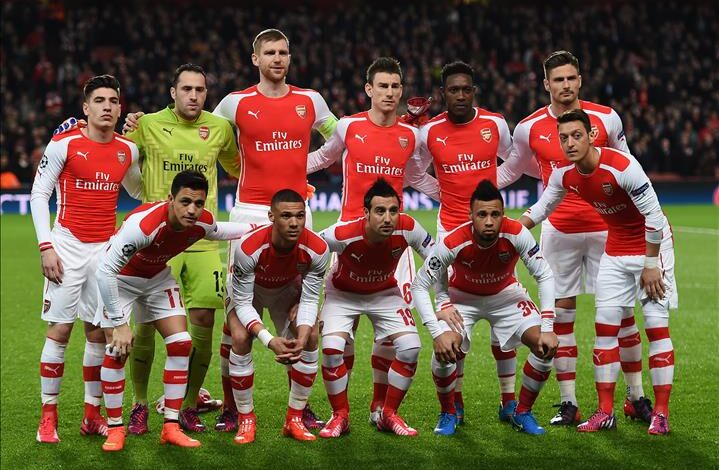The Gunners’ Legacy: Exploring Arsenal Standing Rich History and Future Prospects

Introduction to Arsenal
Arsenal Standing Football Club, commonly referred to as Arsenal, was founded in 1886 in Woolwich, London. With a rich history that spans over a century, the club has garnered a reputation as one of the most successful and prestigious football teams in the world. As a member of the English Premier League, Arsenal has not only achieved numerous domestic and international accolades, but it has also played a pivotal role in the development of football as a global sport.
Over the years, Arsenal has amassed an impressive collection of trophies, including multiple league titles and FA Cups. The club is particularly renowned for its invincible season in 2003-2004, during which they completed the league campaign without a single defeat. This remarkable achievement remains a defining moment in football history and serves as a testament to the high level of talent and dedication of players associated with the club.
The significance of Arsenal extends beyond its on-pitch accomplishments; the club has fostered a passionate and diverse fan base that spans the globe. Known affectionately as “The Gunners,” Arsenal supporters are characterized by their unwavering loyalty and commitment to the team, whether attending matches at the iconic Emirates Stadium or following from afar. This unique culture of support contributes greatly to the club’s identity, as fans engage in a shared sense of pride and community.
As Arsenal continues to evolve, it remains committed to maintaining its rich traditions while adapting to the changing landscape of modern football. With an eye towards future prospects, the club aims to reclaim its position among the elite teams in both domestic and European competitions. This introductory exploration lays the groundwork for a deeper examination of Arsenal’s historical milestones and its aspirations to continue thriving in the beautiful game.
Arsenal’s Historical Milestones
Arsenal Football Club, founded in 1886, stands as one of the most iconic institutions in English football. Initially started as a workplace team for munitions workers in Woolwich, the club transitioned to become a part of the English Football League in 1893. This pivotal move not only marked the commencement of their competitive journey but also set the stage for the club’s future successes.
One of the significant milestones in Arsenal’s history was their first FA Cup victory in 1930. Under the management of Herbert Chapman, the team defeated Huddersfield Town, cementing Arsenal’s reputation as a formidable force in the sport. This success was instrumental in establishing the club’s status and instilling a sense of pride among its supporters. The 1930s also witnessed Arsenal’s dominance in English football, as they secured five league titles and two FA Cups during this period, further solidifying their legacy.
As the years progressed, Arsenal continued to evolve, experiencing numerous highs and lows. The 1970s marked another defining moment, as the club achieved a historic double by winning both the FA Cup and the league title in 1971. This achievement not only exemplified the club’s resilience but also showcased their ability to compete at the highest levels. The famous “Invincibles” season of 2003-2004, where Arsenal went through the entire league campaign unbeaten, is another notable chapter in the club’s illustrious history. This remarkable feat remains a benchmark in English football, inspiring future generations of players and fans alike.
Throughout its rich history, Arsenal has established itself not just as a football club, but as a central figure in the narrative of English and global football. Their milestones represent a journey filled with tenacity and triumph, reflecting the club’s deep-rooted influence in the sport.
Legendary Players Who Shaped Arsenal
Throughout its storied history, Arsenal Football Club has been privileged to witness the contributions of numerous legendary players, each of whom has left an indelible mark on the fabric of the institution. Notably, Thierry Henry stands out as one of the most iconic figures in Arsenal’s history. His remarkable goal-scoring prowess and ability to change the dynamics of a match made him a pivotal player for the Gunners. Henry’s tenure at Arsenal saw him amass a record number of goals, while his electrifying performances—including memorable moments such as his stunning solo strike against Tottenham—cemented his status as a club legend.
Another key figure in the annals of Arsenal is Tony Adams, a stalwart in defense and a natural leader. As the captain of the Gunners for over a decade, Adams was not only a rock at the back but also played a crucial role in guiding the team to multiple league titles. His leadership qualities and unwavering commitment to the club inspired those around him and fostered a winning mentality that resonated through generations of players. Adams’ iconic presence on the pitch and his penchant for scoring crucial goals during critical fixtures remain etched in the minds of Arsenal supporters.
Ian Wright, with his infectious enthusiasm and knack for finding the back of the net, also deserves mention among Arsenal’s legends. Wright’s arrival in the 1990s heralded a new era of attacking football for the Gunners. His impressive goal tally and relentless work ethic turned him into a fan favorite. Beyond his contributions on the field, Wright’s charismatic personality has allowed him to hold a special place in the hearts of Arsenal fans, creating a lasting legacy for future generations to admire.
Trophies and Achievements: A Hall of Fame
Arsenal Football Club, known affectionately as the Gunners, boasts a rich history filled with numerous trophies and significant achievements that have solidified its status as one of the most prestigious clubs in the world. Established in 1886, Arsenal has built a legacy characterized by competitive spirit and triumph, with vital contributions to the footballing landscape in England and beyond.
One of the most outstanding aspects of Arsenal’s achievements is its record in the FA Cup. As of October 2023, the club has clinched this prestigious trophy an impressive 14 times, making it the most successful club in the tournament’s history. The Gunners’ consistent performances in this knockout competition highlight their resilience and ability to compete at the highest level. Notable FA Cup victories include those from 1971, 1993, and the iconic 2014 win, which marked their return to trophy success after a lengthy drought.
In addition to their FA Cup triumphs, Arsenal has also secured 13 league titles, showcasing their dominance in English football. Their unbeaten season in 2003-04, known as “The Invincibles,” stands as a significant accomplishment, with the Gunners finishing the Premier League campaign without a single defeat. This feat remains a benchmark in football history, representing exceptional consistency and quality over the entire season.
Furthermore, Arsenal’s engagements in European competitions have also contributed to their formidable reputation. While the coveted UEFA Champions League trophy eludes them, the club reached the finals in both 2006 and earlier, demonstrating their competitiveness on the continental stage. Overall, the Gunners’ myriad of trophies and accolades not only reflects the club’s glorious past but also serves as a source of inspiration for future endeavors. Such a rich trophy cabinet underpins Arsenal’s ambitions and aspirations as they continue to strive for excellence in the world of football.
Arsenal’s Rivalries in Football
Arsenal Football Club, one of the most storied teams in English football, has cultivated some of the fiercest rivalries in the sport. Among these, the rivalry with Tottenham Hotspur, known as the North London Derby, stands out as one of the most intense. This rivalry dates back to the early 20th century and is characterized by the proximity of the clubs’ respective home grounds. Matches between these two teams often evoke a passionate atmosphere, fueled by the historical competition and the desire for bragging rights in North London. Noteworthy encounters during this rivalry have included high-stakes clashes and dramatic late goals, solidifying their matches as not just regular fixtures, but crucial markers in each club’s season.
Another significant rivalry for Arsenal is with Chelsea. This contest has intensified over the years, especially as both teams have competed for domestic success and European accolades. The proximity and the contrasting identities of the clubs—Arsenal often embodying tradition and stability while Chelsea has been perceived as a modern powerhouse—add depth to their matches. Memorable moments, such as the 2002 FA Cup final where Arsenal triumphed, exemplify the stakes involved whenever these two London clubs meet on the pitch.
Furthermore, Arsenal’s rivalry with Manchester United has shaped the landscape of English football, particularly throughout the late 1990s and early 2000s. Both teams were at the pinnacle of English football during this era, competing fiercely for league titles. Highlighted by memorable matches, such as the famous battles during the 1998-1999 season, these encounters encapsulated the essence of competitive spirit in football. It is in these rivalries—North London, West London, and with Manchester United—that the true spirit of what it means to be a supporter of Arsenal is revealed. Each match carries not just the weight of three points, but also the pride of the club and its rich heritage.
The Role of Youth Development at Arsenal
Arsenal Football Club has long been recognized for its unwavering commitment to youth development, a cornerstone of its philosophy. This dedication is primarily embodied in the club’s esteemed academy, which has produced an impressive array of talent that has significantly contributed to both the first team and the wider football community. At the heart of Arsenal’s approach lies the belief that nurturing homegrown talent not only strengthens the squad but also instills a sense of identity and pride among fans.
Over the years, various homegrown players have emerged from the academy, showcasing their skills on the Premier League stage and often becoming pivotal figures for the club. Names such as Ashley Cole and Jack Wilshere exemplify the successful fruits of the academy, both of whom established their careers at Arsenal before moving on to global recognition. Ashley Cole, in particular, stands out as a key player who not only won numerous titles but also represented the England national team, highlighting how local talent can excel both domestically and internationally. Jack Wilshere’s creativity and playmaking abilities made him a fan favorite, and his journey from youth prospect to first-team star remains a testament to the academy’s role in developing skilled footballers.
The club continues to place significant emphasis on youth development, investing in state-of-the-art training facilities and experienced coaching staff. This forward-thinking approach is evident in their recruitment strategies, where the focus is not solely on finding ready-made talent but on identifying young prospects with the potential to grow into future stars. Additionally, Arsenal’s philosophy fosters an environment where young players can thrive, encouraging both personal and athletic development. As the club navigates the challenging landscape of modern football, its steadfast commitment to youth development will undoubtedly remain a vital strategy for achieving long-term success.
The Emirates Stadium: A Modern Marvel
The Emirates Stadium, home to Arsenal Football Club, stands as a testament to modern architecture and innovation in sports facilities. Opened in 2006, this impressive venue replaced the historic Highbury Stadium, fulfilling the club’s need for a larger and more contemporary space. With a seating capacity of over 60,000, the Emirates Stadium is not only one of the largest football stadiums in the United Kingdom but also a significant cultural symbol for the club and its loyal supporters.
Designed by the renowned architectural firm HOK Sport, the stadium showcases a sleek and modern aesthetic, characterized by its distinctive curved roof and striking exterior. The design emphasizes both functionality and fan experience, incorporating state-of-the-art facilities and amenities. Fans are treated to exceptional views of the pitch from virtually every seat, which enhances the matchday atmosphere. Additionally, the Emirates Stadium features various hospitality options, ensuring a memorable experience for all attendees.
Beyond its physical attributes, the Emirates Stadium holds profound significance within Arsenal’s identity. The construction of this modern marvel represented a substantial financial investment, allowing the club to compete at the highest levels of football, both domestically and in European competitions. Furthermore, the stadium acts as a focal point for the club’s community initiatives, education programs, and outreach efforts, reinforcing Arsenal’s commitment to making a positive impact beyond the pitch.
The Emirates Stadium is more than just a sports venue; it is a cultural landmark that embodies the spirit of Arsenal. It serves as a gathering place for fans, fostering a sense of unity and pride among supporters. In this way, the stadium plays a crucial role in maintaining and nurturing the legacy of Arsenal, ensuring that the club continues to thrive both on and off the pitch.
Recent Performance and Current Squad Analysis
Arsenal has experienced a transformative journey in recent years, marked by fluctuations in performance across both domestic and international competitions. The club’s recent form indicates a potential resurgence as one of football’s elite teams. Under the guidance of a new coaching staff, Arsenal has seen an evolution in playing style, focusing on a more dynamic and possession-based approach that captivates fans and heightens competitive intensity.
In domestic league play, Arsenal has shown significant improvement, competing closely with traditional powerhouses such as Manchester City and Liverpool. The infusion of new talent alongside established players has contributed to a more cohesive unit on the pitch. Key signings have reinforced both the defensive and attacking fronts, with strategic acquisitions aligned to bolster depth and versatility across the squad. Notable performances from emerging stars reflect a commitment to cultivating homegrown talent, further solidifying Arsenal’s reputation for developing exceptional players.
Internationally, Arsenal’s endeavors have met with challenges, yet the team’s resilience has become apparent. The club aims to regain its footing in European competitions, striving to progress past the group stages and make meaningful impacts. The current squad, which boasts a mix of seasoned veterans and promising youngsters, showcases a harmonious blend of experience and exuberance essential for success on larger platforms.
Tactically, Arsenal has embraced a fluid playing style, encouraging creativity while emphasizing a strong defensive framework. This shift not only enhances their competitiveness but also entertains the loyal fanbase that has stood by the Gunners through various trials. The coaching staff’s strategies have been pivotal in refining the squad’s overall cohesion and adaptability, ensuring they continually advance toward reclaiming their standing in football’s upper echelons.
Future Prospects: The Road Ahead for Arsenal
As Arsenal Football Club continues to navigate the complexities of the modern football landscape, its future prospects hinge on strategic decisions that encompass various dimensions of the institution. The primary focus lies in optimizing transfer policies, refining managerial approaches, and addressing emerging challenges to ensure sustained success.
In recent years, Arsenal has demonstrated a commitment to cultivating young talent through its academy, a strategy that not only enhances financial sustainability but also fosters a competitive edge on the pitch. By integrating promising players from the youth setup into the first team, Arsenal can nurture homegrown stars who possess a deep understanding of the club’s values and history. This ethos aligns with the overall vision of establishing a strong foundation for future triumphs.
Equally important is the managerial direction. The selection of a skilled manager who can inspire and cultivate a unified team is paramount. As seen with previous successes, the right leadership can galvanize the squad and bring out the best in players. Effective communication and a clear tactical vision are essential to propel Arsenal towards its goals. There is also increasing emphasis on data analytics and sports science, which can further enhance performance levels and strategic planning.
However, potential challenges lie ahead. Competition in domestic and European leagues is fierce, requiring Arsenal to continually adapt and innovate. Financial constraints and the need to balance competitiveness with fiscal responsibility present a dual challenge that necessitates astute governance. Additionally, maintaining a dedicated fan base while managing expectations will play a critical role in Arsenal’s ongoing journey.
In conclusion, Arsenal Standing rich history serves as both a valuable asset and a guiding light as the club contemplates its future. By harnessing its unique heritage alongside forward-thinking strategies, the Gunners can forge a successful path ahead, one that honors its legacy while ambitively reaching for new heights.
You May Also Read This Usaworldtoday.




